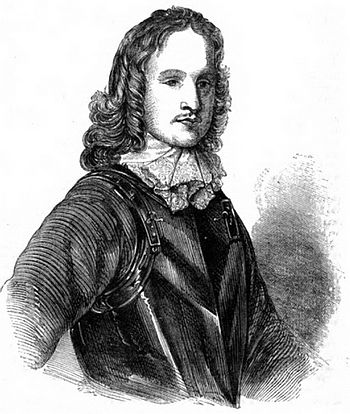into the star-chamber John Lilburne and John Warton, for printing Prynne's "News from Ipswich," and other books called libellous. The accused refused to take the oath proposed to them, protesting against the lawfulness of the court. Being called up several times, and still obstinately refusing, they were condemned to be fined five hundred pounds apiece, Lilburne to be whipped from the Fleet to the pillory, and both bound to their good behaviour.

John Hampden. From an original Portrait.
Lilburne was one of the most determined men that ever lived. He continued to declaim violently against the tyranny of Laud and his bishops whilst he was standing in the pillory and was undergoing his whipping. He drew from his pockets a number of the very pamphlets he was punished for printing, and scattered them from the pillory amongst the crowd. The court of star-chamber being informed of his conduct, sent and had him gagged; but he then stamped with his feet to intimate that he would still speak if he could. He was then thrown into the Fleet, heavily ironed and in solitude.
To complete Laud's attacks on all persons and parties, there lacked only an onslaught on the episcopal bench, and there he found Williams, formerly lord keeper, and still bishop of Lincoln, for a victim. Williams, with all his faults, had been a true friend of Laud's at a time when he had very few, and the wily upstart had declared that his very life would be too short to demonstrate his gratitude: but he took full occasion to display towards him his ingratitude. From the moment that Laud was introduced to the king, Williams could ill conceal his disgust at the clerical adventurer's base adulation. But Laud continued to ascend and Williams to descend. Williams having lost the seals, retired to his diocese, where he made himself very popular by his talents, his agreeable manners, his hospitality, and still more by his being regarded as a victim of the arbitrary spirit of the king and of Laud. Williams, who had a stinging wit, launched a tract at the head of the primate, called the "Holy Table," in which he unmercifully satirised Laud's parade of high altars and popish ceremonies. The
